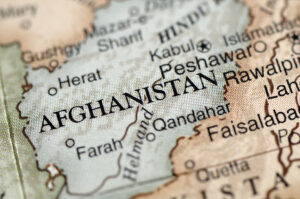
Image by Getty
What’s happening in Afghanistan cannot be the subject of jokes, wise cracks, late night hosts lobbing satirical remarks, or snark. There are tragedies of so many kinds that it is impossible to categorize them all.
It’s déjà vu all over again for those of us old enough to remember the fall of Saigon — now Ho Chi Minh City — in the spring of 1975 (and that excludes many readers, except for us boomers/dinosaurs). I remember vividly watching the helicopters leaving the United States embassy there, people on the roof, clinging to the skids of choppers in desperate efforts to leave behind what was certain to be a dangerous and uncertain future. Take your pick of the videos available on YouTube that chronicle those events. The scenes then are like the scenes in Kabul now. Heartbreaking and tragic.

The Trump Gold Card: A New $1 Million Pathway To A U.S. Green Card
A new proposal would let wealthy foreign nationals secure an opportunity for a U.S. green card with a $1 million 'gift' to the government, sparking legal and ethical debate.
I don’t recall (or I may have been oblivious to) the plight of women and girls when Saigon fell. I didn’t consider what might have been in store for them in South Vietnam. I was in law school at the time and so absorbed in making it through that I paid little attention to the world around me.
This time, my blinders are off. I fear for what is going to happen to the women and girls of Afghanistan — women who are doctors, lawyers, teachers, entrepreneurs, engineers, scientists, and every other choice that Afghan women have had over the past two decades. I fear for the girls who have been able to go to school, who want to learn all about their world and the world outside their landlocked country, who want to be educated. Those girls have grown to adulthood and become those doctors, lawyers, teachers, entrepreneurs, business owners, academics, or whatever else they wanted to be. The consequences for women and girls may well be dire now.
I fear that women and girls will be forced back to the time when they could not leave the house without male accompaniment, when they had to wear burkas the moment they ventured out, when their abilities to participate in the life of their country were denied to them. What recourse will they have to protest? What means, if any, will they have to insist that they continue their lives?
Imagine how women and girls in the United States would react if the same things happened to them, and they lost their abilities to hope, to dream, to challenge, to succeed on a level playing field with men. There are too many “firsts” when women make the headlines because they are the “first” whatever. Will the day ever come when “firsts” no longer have that cachet? No one can say that women here have an easy time of it. It is clearly easier than in Afghanistan, but it’s still not easy here for women.

Introducing LexisNexis Protégé™ in Lex Machina®
Lex Machina harnesses generative AI capabilities to revolutionize the way legal professionals interact with data to improve bottom line for their business.
I look at the advances that women have made in the law in this country in the 45 years or so that I have been a lawyer. I see progress, but not enough. I have been heartened, but also disheartened. Not enough women partners in Biglaw firms making the same kind of money as their male counterparts, not enough women general counsel, not enough women on the bench, not enough female tenured law professors. Not enough women directing legal spend to other women. Not enough women governors, not enough women in Congress, not enough women in state houses. Is comparing the status of women here to the status of women in Afghanistan now absurd, ridiculous, like apples to horses?
We have so many more opportunities here compared to there. However, how many women in the legal profession rise to a point and then stall, just like an airplane in midflight? It’s hard work to pull out of a stall (been there), but it’s so much easier if there is no stall in the first place. I wonder if there’s an invisible burka that lets many women lawyers rise so high, but not any higher.
We can read all the reports we want, all the studies we have, gathering dust on credenzas or in file cabinets, but, at the end of the day, we are still not where we want to be and not where we should be. I know women in this country have it a lot easier than women elsewhere. But women in this country still must navigate sexism, discrimination in all its various forms, retaliation, ageism (my personal fave), and other misconduct. Those misbehaviors are unseen until someone blows the whistle both literally and figuratively. So, are these misbehaviors the unseen burkas that cloak women in our profession?
For the women and girls of Afghanistan, the burkas are all too real. Can you imagine what it is like to have your future ripped from you merely because of your gender? Of course, you can, because that happens here and continues to happen here, and it’s not just gender. But the situation there is so much worse. All your hard work, your dreams, your plans, your ambitions, everything you see in your future is gone for the women and girls there. The stories emerging out of Afghanistan are stark reminders of how women and girls lose power and identity so readily. Speaking truth to power is always risky, given the stakes. I hope that for women lawyers and for every other woman in this country that what is happening there never happens here.
 Jill Switzer has been an active member of the State Bar of California for over 40 years. She remembers practicing law in a kinder, gentler time. She’s had a diverse legal career, including stints as a deputy district attorney, a solo practice, and several senior in-house gigs. She now mediates full-time, which gives her the opportunity to see dinosaurs, millennials, and those in-between interact — it’s not always civil. You can reach her by email at [email protected].
Jill Switzer has been an active member of the State Bar of California for over 40 years. She remembers practicing law in a kinder, gentler time. She’s had a diverse legal career, including stints as a deputy district attorney, a solo practice, and several senior in-house gigs. She now mediates full-time, which gives her the opportunity to see dinosaurs, millennials, and those in-between interact — it’s not always civil. You can reach her by email at [email protected].